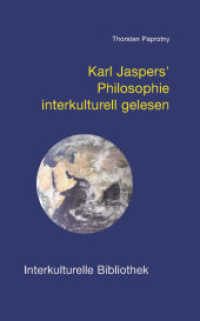- ホーム
- > 洋書
- > 英文書
- > Philosophy
Full Description
A deep dive into the influences of Hegelian thought on the work of revolutionary and postcolonial theorist Frantz Fanon
Hegel is most often mentioned - and not without good reason - as one of the paradigmatic exponents of Eurocentrism and racism in Western philosophy. But his thought also played a crucial and formative role in the work of one of the iconic thinkers of the 'decolonial turn', Frantz Fanon. This would be inexplicable if it were not for the much-quoted 'lord-bondsman' dialectic - frequently referred to as the 'master-slave dialectic' - described in Hegel's The Phenomenology of Spirit. Fanon takes up this dialectic negatively in contexts of violence-riven (post-)slavery and colonialism; yet in works such as Black Skin, White Masks and The Wretched of the Earth he upholds a Hegelian-inspired vision of freedom.
The essays in this collection offer close readings of Hegel's text, and of responses to it in the work of twentieth-century philosophers, that highlight the entangled history of the translations, transpositions and transformations of Hegel in the work of Fanon, and more generally in colonial, postcolonial and decolonial contexts.







